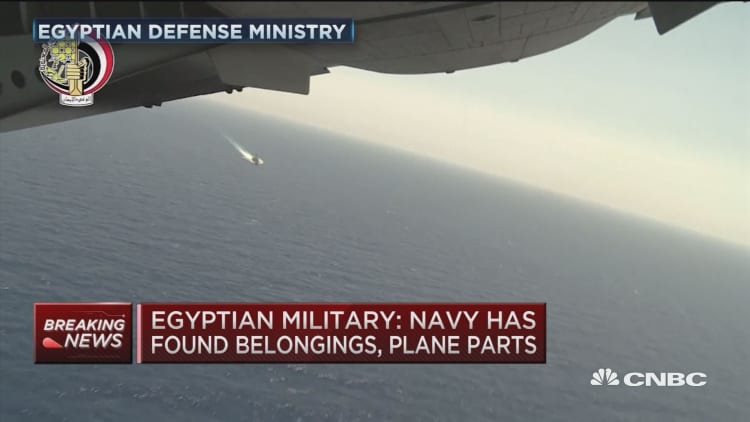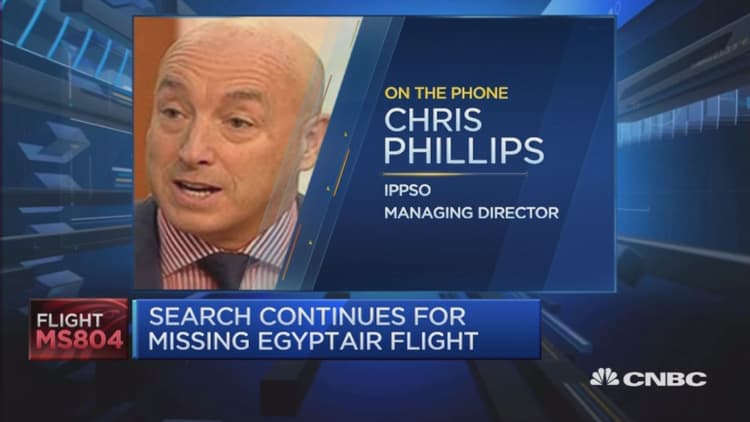
France's aviation accident investigation bureau has confirmed that EgyptAir Flight MS804 sent signals reporting that smoke was detected on the jet before it plunged into the Mediterranean Sea on Thursday, according to Reuters.
According to the brief report, the Bureau d'Enquetes et d'Analyses (BEA) said that the signals did not explain what caused the smoke, and that the priority now was to find the plane's flight recorders.
The Aviation Herald, which reports on aviation news, reported on Friday that it had received information from "three independent channels" that the plane's communications system had sent messages saying that there was smoke in a lavatory and in "avionics" and that there were faults in the "FCU" and "SEC 3."
The New York Times reported that the avionics bay is where much of a plane's electronic equipment is housed.
The FCU, or flight control unit, refers to a control panel used by the pilot to control settings such as speed and altitude. According to a report by NBC News' Tom Costello, the SEC 3 is a computer that controls the plane's spoilers and elevator computers.
The automated messages were sent by the Airbus A320's Aircraft Communications Addressing and Reporting System (ACARS), the Aviation Herald reported.
Flight MS804 disappeared from radar over the Mediterranean Sea in the early hours of Thursday while en route from Paris to Cairo. It was carrying 66 people: 56 passengers, including a child and two infants, as well as three of the airline's security staff and seven crew members.
On Friday Egypt found debris from the missing plane. In a tweet on Friday early evening local time, EgyptAir said that the Egyptian Military and Marine Forces had "discovered more debris," adding that the wreckage found included passengers' body parts, belongings and luggage and aircraft seats.
"Search is still in progress," the Egyptian flagship carrier tweeted.

A veteran pilot - Mahamed Saeed Ali Shouqair – was the flight's commander.
According to an NBC News report, Greek air traffic controllers communicated normally with the pilot as the plane left Greek air space but were unable to contact the plane shortly after when attempting to hand communications to Egyptian air traffic controllers. The plane was about 10 miles into Egypt's air space and at an altitude of 37,000 feet when it disappeared from radar screens.
Greek Defense Minister Panos Kammenos said that the A320 had swerved 90 degrees to the left then spun through 360 degrees to the right before plunging to an altitude of 15,000 feet before disappearing from Greek radar screens, Reuters reported.

Greek and Egyptian investigation teams had been searching the Mediterranean for wreckage of the missing plan, aided by French, Turkish and U.S. military support.
The cause of the crash has not yet been identified. Although Egyptian Civil Aviation Minister Sherif Fathy told CNN that a terrorist attack was more likely than that of a technical failure, no terror group has yet claimed responsibility.
Newswires reported that Egyptian checks on the passenger list had thrown up no known security issues, and two U.S. intelligence officials told NBC News on Thursday night that there was "nothing finite, nothing specific" in chatter from militant groups about a coming attack on aviation.
Two former senior crash investigators told Reuters on Friday that the list of possible causes remained wide open, noting there had been cases where deliberate action had been suspected wrongly.
In 1996, a terrorism probe was launched after a TWA jumbo jet crashed off Long Island, New York, on the east coast of the United States, Reuters reported, but investigators later found it had probably been brought down by a fuel tank explosion.
Regardless, the crash is another blow to Egypt, which is still reeling from the October crash of a Russian holiday jet that killed all 224 people on board.
The Airbus A321, operated by Russian airline Kogalymavia under the brand name Metrojet, was flying from the popular Egyptian Red Sea resort of Sharm el-Sheikh when it went down in the central Sinai area soon after daybreak, crashing into a mountainous area shortly after losing radar contact while near cruising altitude.
Russia said that the plane had likely been brought down by a bomb, as did the U.S. and other Western governments, and the Islamic State (IS) militant group claimed responsibility. But Egypt said that its investigations revealed no sign of terrorism. There has been no definitive finding on the cause of the Metrojet crash as yet.


